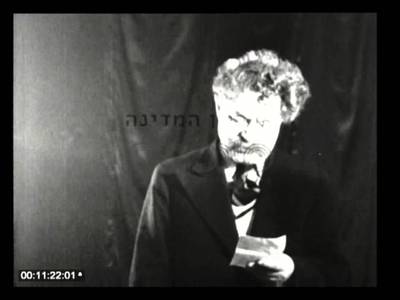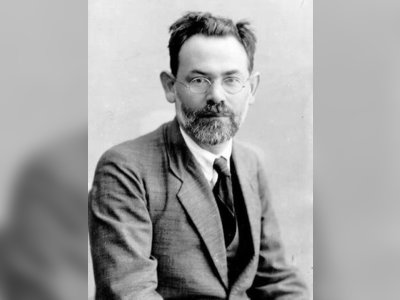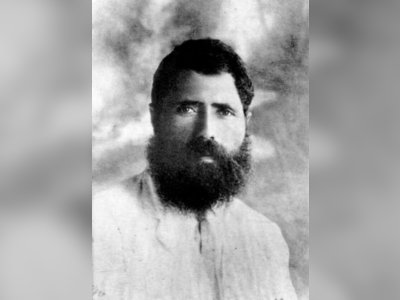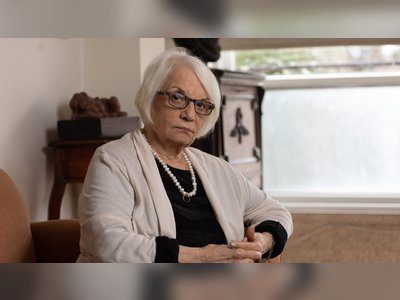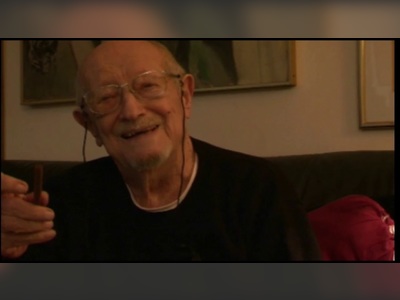Shabtai Tevet: A Literary Portrait of Israel's Chronicler
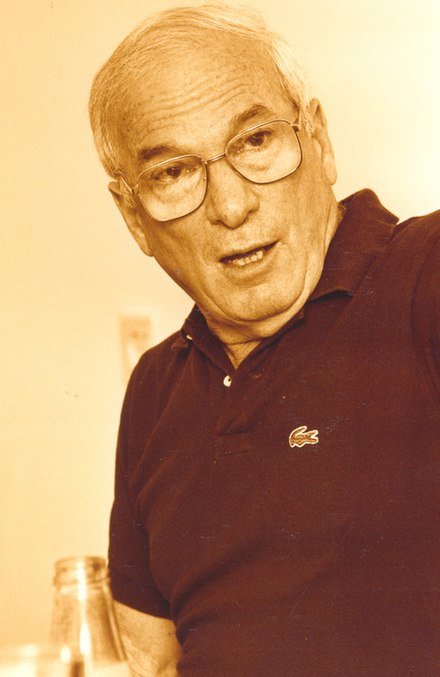
Shabtai (Amos) Tevet (Tebtchnek; December 25, 1925 - November 2, 2014) was an Israeli journalist, biographer, and author. He was awarded the Israel Prize in 2005 for his significant contributions. His literary works primarily focused on the history of the Jewish settlement and the State of Israel. His most notable achievement was the biography of David Ben-Gurion, spanning four chronological volumes accompanied by five thematic volumes.
Biography
Tevet was born in the agricultural village of Mahalal Tzedek near Petah Tikva, Israel. His parents, Shifra and Dov Tebtchnek, were pioneers of the Third Aliyah, early Jewish immigrants to Palestine. During his childhood, his family relocated to various places, including Eilat Hashachar, Ramat David, and Atlit, finally settling in Tel Aviv. There, he attended an educational institution for the children of laborers and later, the Shalva High School.
From 1944 to 1946, Tevet pursued a bachelor's degree in Hebrew literature, philosophy, and English literature at the Hebrew University of Jerusalem while simultaneously writing for the "Mishmar" newspaper in Jerusalem. He completed his second degree at Temple University in Philadelphia between 1946 and 1948, where he supported himself through writing for "The New York Gazette" and "The Philadelphia Inquirer."
When the War of Independence broke out, Tevet returned to Israel with a group of volunteers. However, the ship on which he sailed, the "Egna," arrived in Haifa's port a day after Israel's declaration of statehood, and Tevet was arrested along with the other volunteers for a few months. Upon his release, he enlisted in the Palmach's Third Battalion, later working in the Labor Ministry and becoming deputy editor of the military magazine "Bamachaneh."
In the early 1950s, Tevet wrote scripts for military propaganda films, some of which were screened in cinemas, including "Chotz Hachanit" directed by Nathan Gross, and a film about the early pioneers of the Israeli Air Force, directed by Alfred Steinhardt.
In 1956, during Operation Kadesh, he was drafted into the reserves as a military writer and accompanied various units in the field. After completing his service, he published his experiences in the book "The Sinai Campaign."
From 1950 to 1983, Tevet worked for the newspaper "Haaretz," and for twenty-three years, he was a member of the newspaper's editorial board. He was mentored by the newspaper's editor, Gershom Schocken, and contributed articles, investigative reports, and lists to the paper. Among his notable works were investigations into Moroccan immigration, Israel's police force, and the citrus industry.
During his career, Tevet wrote numerous articles about the political elite of his time, particularly figures from Mapai (the Workers' Party of the Land of Israel), and other political parties. He exposed irregularities in the 1959 Mapai branch elections in Tel Aviv, published a series of investigations into the power structure of Yosef Almogi, and his 1959 investigation into the Haifa municipality under the leadership of Abba Hushi caused a stir.
His 1960 exposé led to a landmark Supreme Court ruling by Judge Moshe Landau in the "Soldiers' Line" case, unveiling alleged police corruption involving senior officers, including Amos Ben-Gurion, the Prime Minister's son. Tevet also published a series of articles on the murder of Rudolf Kasztner, which preceded the district court's ruling.
His 1959 investigation into the Haifa municipality, led by Abba Hushi, stirred controversy, with David Ben-Gurion stating that the city was "sinking into darkness" as a result of the allegations. In 1960, he was reprimanded by Supreme Court Judge Moshe Landau in his ruling on the "Soldiers' Line" case, which exposed corruption in the police force, allegedly involving senior officers, including Amos Ben-Gurion, the son of the Prime Minister. Tevet published a series of articles on the murder of Rudolf Kasztner, a case that preceded the district court's ruling.
In 1981, Tevet was appointed a research associate at the Moshe Dayan Center for Middle Eastern and African Studies at Tel Aviv University.
In 2002, he suffered a brain injury and stopped writing.
In 2005, Shabtai Tevet was awarded the Israel Prize. The judges stated: "The Israel Prize is awarded to Shabtai Tevet for his monumental work in writing the biography of David Ben-Gurion, 'Knesset David.' ... Tevet's remarkable achievement consists of thousands of small details he collected, analyzed, and organized into a splendid historical-literary creation. His work is an invaluable asset to Israeli society and the Jewish people."
Personal Life
Tevet was married to Ora, the daughter of Shlomo Zalman Ariel and the widow of Nathan Alterman. They had three children, a daughter, Ya'el Tevet-Klagsbald, who is a journalist and songwriter, married to lawyer Avigdor Klagsbald, and a son, Shaul Tevet (Ariel), who is an artist and the owner of a bar in Tel Aviv.
He passed away at the age of 89 after a prolonged illness and was buried in the Shikun Vatikim Cemetery in Shefayim.
Literary Legacy
Tevet gained recognition with his book "Exposed in Tzrich" (1968), which became a bestseller. The book described the struggles of the Sarayon (paratrooper) units, especially that of Brigade 7 under the command of Samuel Gonen, during the Six-Day War.
In 1973, he began writing the series of books "Knesset David" about David Ben-Gurion while Ben-Gurion was still alive. The first volume, "The Young," was published in 1977, focusing on Ben-Gurion's youth. The second volume, "The Rebel," published in 1980, covers the years 1919-1933 and deals with the formation of the Histadrut (labor federation).
The third volume, "The Burning Ground," focuses on Ben-Gurion's leadership as the head of the Jewish Agency from 1933 to 1943. The fourth volume, "Knesset David," published in 2004, delves into the years 1942-1946, covering Ben-Gurion's unwavering commitment to his people and his fight for the immediate establishment of a sovereign Jewish state in Israel, as proposed in the Biltmore Program.
It also discusses the mass immigration to Israel, rescue attempts for European Jews during the Holocaust, the struggle with the Etzel and Lehi undergrounds, and the preparation of the Israeli military for the establishment of the state.
In addition to his works on Ben-Gurion, Tevet wrote five other books related to the early history of Israel, such as "The Murder of Arlosoroff," which led to the establishment of a special committee and a royal commission of inquiry, and "Exposed in Tzrich" (as mentioned above).
He also wrote "The Curse of Blessing," focusing on the early years of the Israeli military administration in the territories (up to 1968), "Shashua and His Daughter," a novel addressing poverty in Israel, and a biography of Moshe Dayan published at the height of his power.
In 1954, Tevet published a humorous book titled "The Big Family of Shin Tit," featuring a collection of satirical stories about daily life in Israel during its early years.
Shabtai Tevet is regarded as one of the leading opponents of the New Historians, the first to critically examine the level of compatibility between the content of the documents as presented in the works of this group and their true content.
- שבתי טבתhe.wikipedia.org
